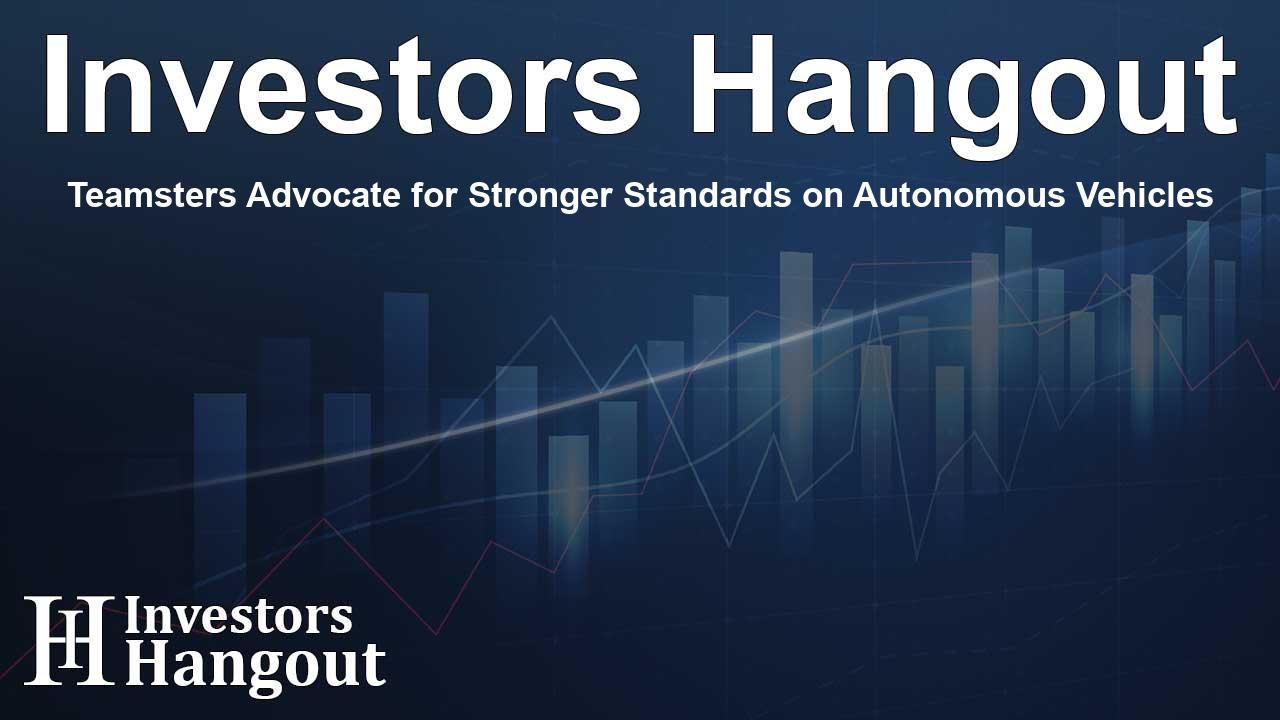Teamsters Advocate for Stronger Standards on Autonomous Vehicles

Teamsters Advocate for Stronger Standards on Autonomous Vehicles
Teamsters Push for Good Jobs, Safe Streets Amid AV Safety Concerns
Recently, the Teamsters have voiced serious concerns regarding autonomous vehicles (AVs) and their impact on public safety and job security. Following the revelation that General Motors (GM) will stop funding its AV subsidiary, Cruise, The Teamsters' leadership has been vocal about the urgent need for regulatory agencies to hold these companies accountable.
Peter Finn, the Teamsters Western Region International Vice President, strongly criticized the decision made by GM regarding Cruise’s funding: "With its decision to cut funding for Cruise AV development, GM is finally acknowledging what the general public already knows: robotaxis are not safe. This has been blindingly obvious ever since Cruise robotaxis ran over pedestrians, blocked first responders from doing their jobs, nearly collided with a seven-year-old boy, and caused traffic pileups on multiple occasions." His statement reflects a broader sentiment that many community members share regarding autonomous vehicles.
The Teamsters point out that it is not just GM that is at fault. Companies like Waymo and Zoox have been under fire for similar safety concerns, putting pedestrians in risky situations and endangering the public. Finn emphasized, "These companies aren't just threatening public safety; they're threatening the livelihoods of tens of millions of Americans who turn a key for a living." This underscored a call for action from regulatory bodies to address the challenges posed by AVs.
The urgency for effective oversight cannot be overstated. Finn noted, "The news about GM and Cruise should serve as a wake-up call to regulatory agencies about the potential hazards these vehicles pose. The California Public Utilities Commission, the California Department of Motor Vehicles, and the National Highway Traffic Safety Administration need to step up and enforce existing AV regulations. They should implement new, necessary standards to safeguard our communities and protect American jobs. We must ensure our roads remain safe for every citizen, alongside maintaining good paying jobs for our workers.”
The Teamsters Joint Council 7 represents 100,000 members across 18 local unions in various regions. Their advocacy for safe working conditions and secure jobs underscores their commitment to not only their members but also to the general public's safety.
As technology continues to evolve rapidly, the responsibility to ensure safety and ethical standards ultimately falls on both regulatory bodies and companies alike. There is a rising concern that if too much power is entrusted to tech corporations without due diligence, the consequences could be dire—not just for workers but for everyone who uses public roads.
In light of these developments, the Teamsters will persist in their push for accountability from both transportation regulatory agencies and the tech companies that often prioritize profit over public welfare. They aim to keep streets safe and support the workers whose livelihoods are jeopardized by such advancements in technology.
Frequently Asked Questions
What recent decision did GM make regarding autonomous vehicles?
GM has announced it will cease funding for its autonomous vehicle subsidiary, Cruise.
Who has been vocal about safety concerns regarding autonomous vehicles?
Peter Finn, the Teamsters Western Region International Vice President, has publicly expressed concerns regarding the safety of autonomous vehicles.
What are the Teamsters advocating for in relation to autonomous vehicles?
The Teamsters are advocating for stronger regulations and accountability for autonomous vehicle companies to ensure public safety and protect jobs.
How do autonomous vehicles impact the livelihoods of American workers?
According to the Teamsters, autonomous vehicles threaten jobs for millions of Americans who rely on driving as their primary source of income.
What is the role of regulatory agencies in the context of autonomous vehicles?
Regulatory agencies are tasked with enforcing existing laws and creating new regulations to ensure the safety of autonomous vehicles on public roads.
About The Author
Contact Henry Turner privately here. Or send an email with ATTN: Henry Turner as the subject to contact@investorshangout.com.
About Investors Hangout
Investors Hangout is a leading online stock forum for financial discussion and learning, offering a wide range of free tools and resources. It draws in traders of all levels, who exchange market knowledge, investigate trading tactics, and keep an eye on industry developments in real time. Featuring financial articles, stock message boards, quotes, charts, company profiles, and live news updates. Through cooperative learning and a wealth of informational resources, it helps users from novices creating their first portfolios to experts honing their techniques. Join Investors Hangout today: https://investorshangout.com/
The content of this article is based on factual, publicly available information and does not represent legal, financial, or investment advice. Investors Hangout does not offer financial advice, and the author is not a licensed financial advisor. Consult a qualified advisor before making any financial or investment decisions based on this article. This article should not be considered advice to purchase, sell, or hold any securities or other investments. If any of the material provided here is inaccurate, please contact us for corrections.
